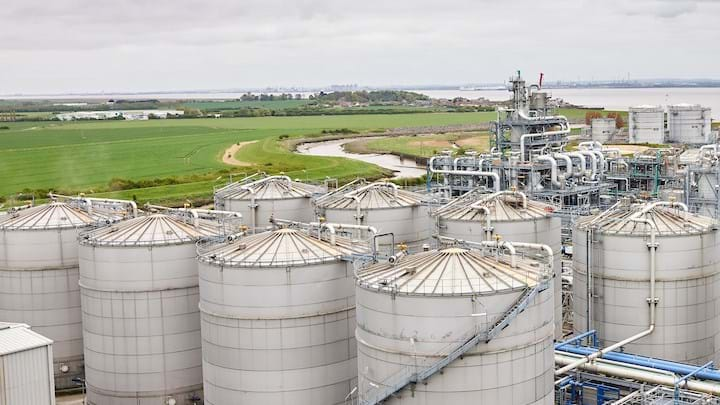UK bioethanol plant warns of imminent closure after US trade deal

THE UK’s largest bioethanol manufacturing plant will close “in the next few weeks” if it does not receive financial support from the government, its operator has threatened, putting 160 jobs at risk.
Vivergo Fuels, the bioethanol producer wholly owned by Associated British Foods, warned suppliers in a letter published on its website this week that the plant would close “if there is not government intervention”.
The plant at the Saltend Chemicals Park in Hull is the larger of the UK’s two producers of bioethanol. Vivergo’s managing director Ben Hackett blamed the company’s current commercial vulnerability on “a series of decisions that undercut UK ethanol production in favour of US imports”.
In the letter, Hackett said that the US-UK trade deal signed in early May was “the final blow”. The deal will offer US ethanol producers 1.4bn litres’ worth of tariff free exports to the UK instead of the existing 19% duty – equivalent to the UK’s entire annual demand for the chemical.
The exact terms of the trade deal are not yet clear, and the non-binding agreement could still be subject to change. Meanwhile, news this morning that a US trade court has blocked President Trump’s tariffs adds further uncertainty to how the US-UK trade deal will pan out in practice.
The Department for Business and Trade has said it is “open to discussion” over support for UK bioethanol plants. However, Vivergo’s letter on Tuesday said that the government has made “no commitments”.
US ethanol is already very cheap, produced from the vast amounts of maize grown in the Midwest. Vivergo makes ethanol from feed-grade wheat from over 12,000 farms across the UK, mostly in Lincolnshire and Yorkshire.
Vivergo’s bioethanol is mostly used in E10 petrol blends, while by-products are used for high protein animal feed.
Simon Marsh, employment policy director at the Chemical Industries Association (CIA), told TCE that Vivergo’s announcement is a “real-life example of the perils of government entering into negotiations without consulting industry practitioners.
“Those operating in the sector are well placed to quickly share expertise to ensure that damaging but unintended consequences are avoided.
“This is a decision that undercuts domestic producers to secure a limited agreement with the US that flies in the face of long-term resilience with serious implications for the wider manufacturing industry.”
A government spokesperson said: “We signed a deal with the US in the national interest to secure thousands of jobs across key sectors.
“We are now working closely with the industry to understand the impacts of the UK-US trade deal on the UK’s two bioethanol companies and are open to discussion over potential options for support.
“The business secretary has met members of the bioethanol sector and senior officials continue to consider what options may be available to support the impacted companies.”
Ensus, the UK’s other major bioethanol manufacturer, faces the same pressure. According to the Renewable Transport Fuel Association (RTFA), the Teesside-based plant is the UK’s only large-scale facility capturing CO2 that can be used in drinks.
According to the Financial Times, the RTFA predicts that closure of the UK’s two bioethanol plants could cost wheat farmers £200m (US$269.2m) per year as a result of a feared price slump.
In a letter seen by the newspaper, RTFA CEO Gaynor Hartnell warned that the impacts of closure “will be felt in the supermarket and at the pub because of the CO2, by farmers in the North East whose feed wheat price will fall, by motorists and the environment, and certainly by the government in terms of its lost credibility.”
Recent Editions
Catch up on the latest news, views and jobs from The Chemical Engineer. Below are the four latest issues. View a wider selection of the archive from within the Magazine section of this site.




